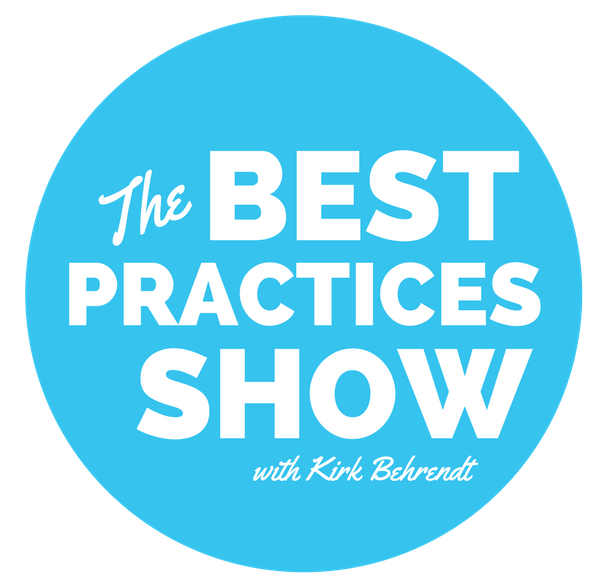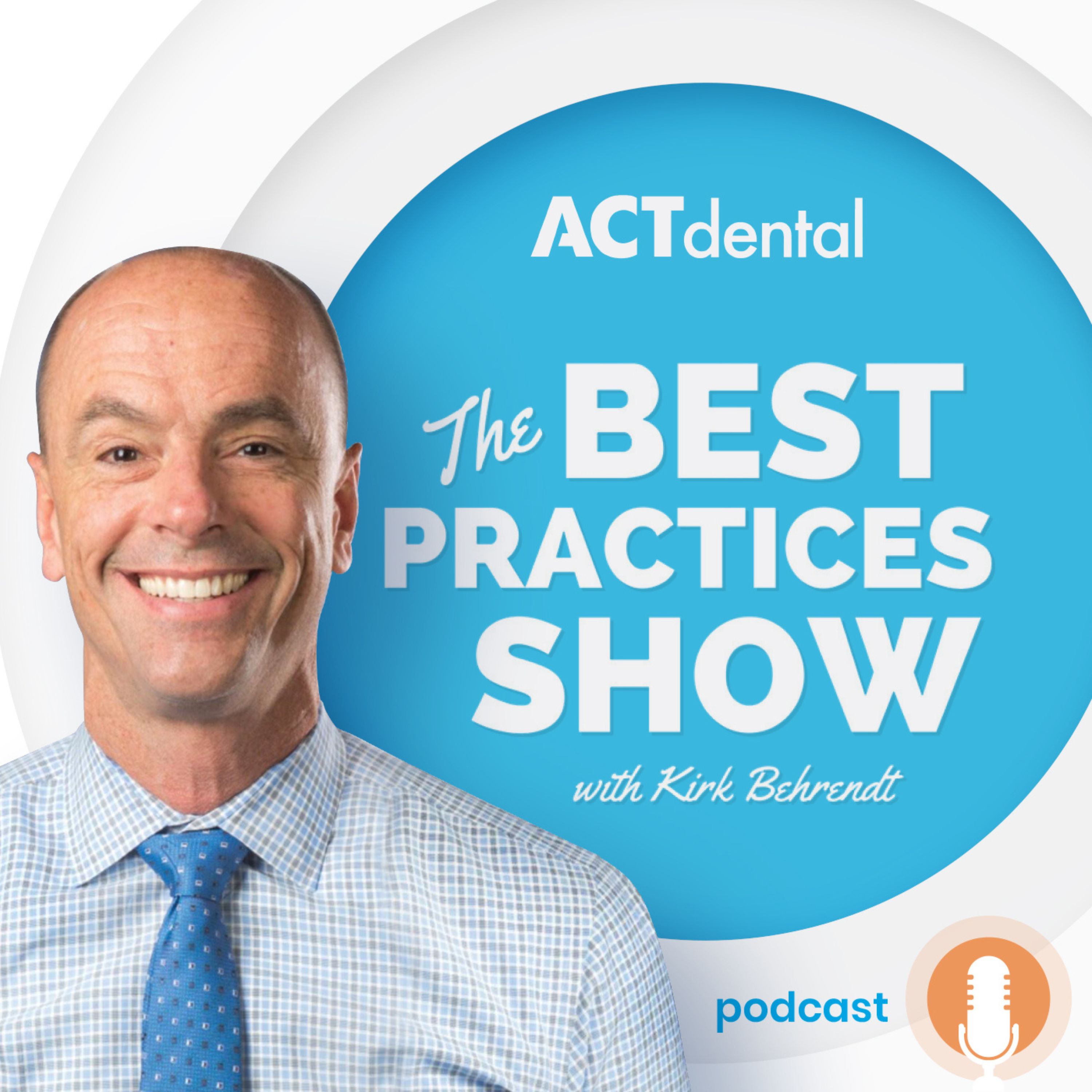Episode 355
355: Mastering Verbal Skills – Part 1 - Jenni Poulos
Mastering Verbal Skills – Part 1
Episode #355 with Jenni Poulos
Would you rather “pay a bill” or “make an investment”? Words carry weight, and language matters — especially with your patients. And to help you master the verbal skills you need for your practice, Kirk Behrendt brings in Jenni Poulos, one of ACT’s lead practice coaches, for a three-part series to explain every key concept you need to know. To learn how to become a better listener and communicator, listen to Episode 355 of The Best Practices Show!
Main Takeaways:
There are eight key concepts to master verbal skills:
1) Expectation minus reality equals conflict.
2) Language matters.
3) Build connection and value.
4) Ask the right questions.
5) Become a better listener.
6) Listen to understand.
7) It’s a lifetime practice.
8) Be responsible for how information is received.
Quotes:
“[E – R = C is] the most important concept. As a coach, it’s where we begin with teams. It’s important in how we communicate with each other. It’s important in how we communicate with our patients. The things we do and the things we say, when they aren't in alignment, that's when conflict ensues. I mean, I use this in my life. This is literally the most foundational concept, that if you can really embrace this and learn, ‘How can I make the expectations that I'm setting up for my team members, for my patients, and the reality of what they experience be in alignment?’ will your days be better.” (6:16—6:59)
“Language really does matter. The words that we say, the words that we use, carry weight. The tone that we use, it carries weight. How we say things, how we lean in, what we say and how we say it, matters. So, I want you to choose your words wisely.” (7:40—7:58)
“A really easy example here is when we think about the words “confirming” and “reminding.” I coach the team that I work in, we never “confirm” an appointment. We actually tell patients, ‘We consider appointments confirmed when they are made. We will give you a reminder call.’ Because if I'm calling to confirm the day before, that means it’s not already set in stone. Two words that have a big difference on their impact.” (7:59—8:33)
“An actionable item that's great for teams is, sit down around a table and come up with a “say this, not that,” document. What are some of the words that we want to say in the office that builds connection, that builds trust, that builds value, and what are some of the ones that we want to avoid? Docs all know about the difference between a shot and a little injection. Right? If I tell a kid I'm giving them a shot, they're going to be bouncing out of the chair a little bit than, ‘Hey, I'm just going to have a little poke here.’ Same thing, big impact.” (8:34—9:07)
“The person that is asking the questions is actually the person that's in control of the conversation. So, I want you to get really good at asking questions, but asking the right type of questions, which are open-ended questions. I never want you to be asking things that can be answered with a simple yes or a no because this is how we learn about people.” (11:17—11:41)
“We want to know if we’re safe. As human beings, we want to know if we’re in a safe place. That's our reptilian brain, our amygdala. It’s constantly scanning our environment to say, ‘What's going on around me?’ And by listening to people and asking good questions, we let them know, ‘Hey, you can trust me.’” (12:52—13:14)
“Active listening, it’s such an important skill that you really have to practice. You need to be an active listener. You need to physically lean in. You can't just be listening for what you're going to say. You need to listen for what the patient is saying.” (14:07—14:31)
“Great communicators listen more than they speak.” (15:28—15:31)
“When you become a better listener, you become better at asking questions. And when you become better at asking questions, you eliminate E – R = C moments.” (15:52—16:03)
“Don't be a drive-by communicator. I've seen this happen in offices where a doc or a team member will run by while they're doing something and deliver something really important as they're on to the next thing and assume that it’s landed. If something is important, slow down and give it its due.” (18:36—18:57)
“If you value what you do, you value your practice, you value your team, you're learning, you want to grow, patients will see that and will value it too.” (23:09—23:22)
“When you get this question, [‘Do you take my insurance?’] which you will, I want you to remember, the patient is asking because they have paid for their insurance and they want to use it. And that's fine, and that's great. I have insurance, and when I go to an office, I want to use it. So, don't get upset. I want you to take a breath, put the boulder aside, and respond positively. We always want to respond with a yes.” (24:58—25:25)
“If you're a team member listening to this, or you're a doc listening to this, as an admin team member, we answer a hundred phone calls a day, maybe more. The patient on the other end makes one. So, let's not hurry through it and be annoyed with the conversation. Let's slow down and listen and connect to the other person on the end of the phone that doesn't know what to ask because they’ve only made one phone call.” (28:59—29:29)
“A little tip I have. We are so hurried, and admin team members know there are so many distractions, and we’re multitasking, and I'm not really listening when I pick up that phone and I ask someone’s name. So, I have a little dry-erase board right next to me, and I ask [the patient’s name] and I write their name down right there so I look at it. And it reminds me to use it, and I'm not going to forget it.” (31:28—31:53)
“Patients will follow where you lead them. And if I am leading them and prompting them with a million questions and a million things about insurance — which, also, I would like you to strike the word, “insurance.” We call them benefits, not insurance. It’s your dental benefits.” (42:15—42:37)
“What is the most important thing? Is the most important thing that you provide your patients with relationships and care and treatment that they need to obtain optimal oral health, or is the most important thing that you do what their insurance will cover? So, answer that question for yourself. What's more important, what will be paid for, or optimal health?” (42:42—43:09)
“People tell me all the time, ‘I don't have time for this.’ I hear that often, ‘I don't have time for these questions.’ I say, ‘You absolutely have time for this, because you always have time for relationships.’” (47:35—47:48)
“[There are] two places in the office where I actually want you to strike question-asking from your verbal skillset. I never want you to ask a patient if they would like to schedule, and I never want you to ask a patient if they would like to pay. It’s the two places in the office to never ask a question. Because, why? Patients will follow where we lead them.” (50:51—51:15)
Snippets:
0:00 Introduction.
5:28 Key concept 1) E – R = C.
7:07 Key concept 2) Language does matter.
9:10 Key concept 3) Build connection and value.
10:41 Key concept 4) Get good at asking questions.
13:32 Key concept 5) Focus on becoming a better listener.
14:36 Key concept 6) Listen to understand.
16:37 Key concept 7) It’s a lifetime practice.
17:57 Key concept 8) Be responsible for how information is received.
20:04 Verbiage to deal with objections.
24:37 “Do you take my insurance?”
27:33 Slow down.
29:29 Train your brain to start with a question.
34:41 Ask patients, “Why us? Why now?”
36:23 Be curious.
38:53 “Do you take my insurance?” continued.
42:08 Drop the word “insurance.”
44:57 Other verbiage to use.
50:47 Two questions to never ask.
52:59 Being the patient’s advocate.
56:14 Last thoughts.
Reach Out to Kirk and Jenni:
Kirk’s email: kirk@actdental.com
Jenni’s email: jenni@actdental.com
Jenni’s Facebook: https://www.facebook.com/jenni.poulos
Jenni’s social media: @actdental
Resources:
ACT Dental: https://www.actdental.com/
Jenni Poulos Bio:
Jenni brings to dental teams a literal lifetime of experience in dentistry. As the daughter and sister of periodontists and a dental hygienist, she has been working in many facets of the dental world since she first held a summer job turning rooms and pouring models at the age of 12. Now, with over 10 years of experience in managing and leading a large periodontal practice, she has a firm grasp on what it takes to run a thriving business. Her passion for organizational health and culture has been a driving force behind her coaching career. She has witnessed firsthand how creating an aligned and engaged team will take a practice to levels of success that they never believed possible!


